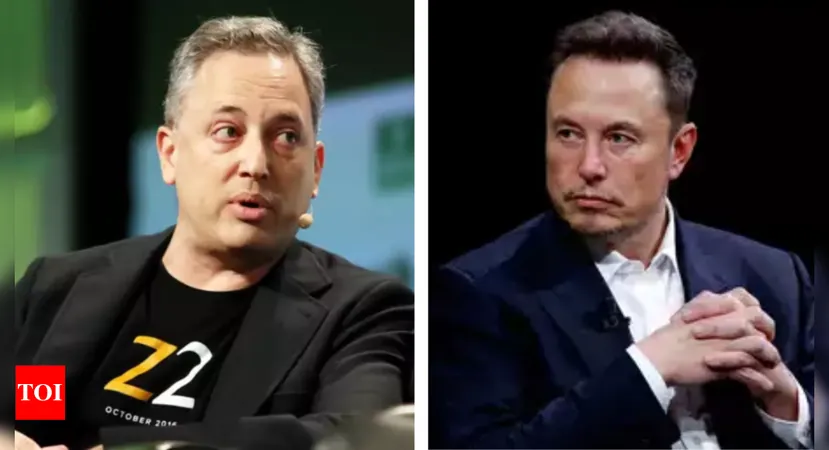
Elon Musk and David Sacks Unite for Revolutionary H-1B Visa Reforms: What You Need to Know!
2024-12-29
Author: Sophie
In a bold move towards reform, David Sacks, fresh from his appointment as the U.S. President-elect Donald Trump's nominee for White House AI and Crypto Czar, paired up with Tesla CEO Elon Musk to promote significant changes to the H-1B visa program. Their shared vision focuses on prioritizing exceptional talent while curbing the misuse of this critical pathway for skilled immigrants.
The two powerhouses emphasized that reforms are essential for revamping a broken system that has long been criticized for allowing low-skill jobs and fraudulent applications to flourish. “It’s time to ‘move forward as one team,’” Sacks asserted, signaling a call for unity among Trump’s allies on the contentious immigration policy debate that has frequently divided them.
What’s the H-1B Visa?
To put it simply, H-1B visas are temporary work permits granted to foreign professionals in specialized fields such as technology, medicine, and law. These visas have been highly sought after, especially by tech companies eager to attract global talent. However, the program has faced scrutiny, particularly during Trump’s administration, which saw it suspended to protect American jobs, a stance that has been contradicted by the current Biden administration's efforts to facilitate the hiring process for employers.
The Ongoing Controversy
The debate over H-1B visas isn’t just bureaucratic; it encapsulates a much larger discussion about immigration, the economy, and American competitiveness. As Trump gears up for a possible second term, the divide within his circle becomes evident. Tech luminaries like Musk and fellow entrepreneur Vivek Ramaswamy are pushing for a more lenient approach favoring the hiring of foreign talent. In contrast, hardliners within Trump’s base vehemently oppose changes, fearing that it jeopardizes job opportunities for Americans.
Tensions peaked following Trump's controversial decision to appoint Sriram Krishnan, an Indian-American entrepreneur and vocal supporter of adjusting immigration policies to make it easier for skilled workers to enter the U.S. Far-right figures, including activist Laura Loomer, condemned Krishnan’s role, viewing it as a threat to American labor interests.
A Defense of Talent
In the face of backlash against Krishnan, David Sacks took to social media to defend his appointment, denouncing critics as a “cabal” peddling misinformation driven by narrow agendas. “This whole cabal against Sriram is totally out of control. We should celebrate people like him, who are eager to contribute to our country,” he argued, emphasizing that a talented workforce is essential to drive innovation and economic growth.
Musk also articulated the dire need for skilled immigrants, comparing it to professional sports—where talent from around the globe is sought after to build winning teams. He believes that the U.S. faces a “dire shortage of extremely talented engineers,” and that reforming the H-1B program is crucial to revitalize the American economy.
The Stakes Are High
As the conversation around H-1B visas intensifies, one thing is apparent: the outcomes of these discussions hold significant implications for the tech industry and the broader U.S. economy. Advocates like Musk and Sacks insist that a streamlined and reformed H-1B visa system could propel America's competitiveness on the global stage, ensuring that it remains a top destination for the world’s best minds.
With the stage set for a broader debate about immigration and economic policy, it remains to be seen how the Trump administration will navigate these complex waters—and whether the voices advocating for reform will successfully sway public and political opinion in their favor.
Stay tuned for more updates on this evolving story, where the intersection of technology, immigration, and policy could shape the future of America.



 Brasil (PT)
Brasil (PT)
 Canada (EN)
Canada (EN)
 Chile (ES)
Chile (ES)
 Česko (CS)
Česko (CS)
 대한민국 (KO)
대한민국 (KO)
 España (ES)
España (ES)
 France (FR)
France (FR)
 Hong Kong (EN)
Hong Kong (EN)
 Italia (IT)
Italia (IT)
 日本 (JA)
日本 (JA)
 Magyarország (HU)
Magyarország (HU)
 Norge (NO)
Norge (NO)
 Polska (PL)
Polska (PL)
 Schweiz (DE)
Schweiz (DE)
 Singapore (EN)
Singapore (EN)
 Sverige (SV)
Sverige (SV)
 Suomi (FI)
Suomi (FI)
 Türkiye (TR)
Türkiye (TR)
 الإمارات العربية المتحدة (AR)
الإمارات العربية المتحدة (AR)